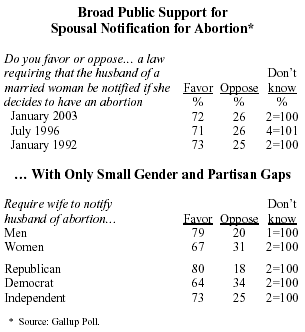Of all the opinions that Judge Samuel A. Alito Jr. has handed down during 15 years on the federal bench, the one drawing the most attention since his nomination to serve on the U.S. Supreme Court is his support in a 1991 case for a provision in a Pennsylvania law that required women, with few exceptions, to notify their husbands before they could have an abortion.
Judge Alito was at odds both with his fellows judges on the U.S. Court of Appeals and, ultimately, with the U.S. Supreme Court, which ruled in 1992 that the spousal notification provision placed an undue burden on women and was therefore unconstitutional.
 But while Alito’s view did not prevail in courts of law, it fares much better in the court of public opinion. Surveys taken since 1992 have consistently shown that the public supports the spousal notification provision by lopsided margins of nearly three-to-one.
But while Alito’s view did not prevail in courts of law, it fares much better in the court of public opinion. Surveys taken since 1992 have consistently shown that the public supports the spousal notification provision by lopsided margins of nearly three-to-one.
The strong public support for spousal notification is part of a complex, cross-cutting pattern of public opinion on abortion-related issues. By more than two-to-one (65%-29% in a July 2005 Pew survey) the public opposes overturning the landmark Roe v. Wade decision that established a woman’s right to an abortion. But at the same time it also strongly favors an array of restrictions on abortion – including mandatory waiting periods, parental consent for minors seeking an abortion; spousal notification for married women seeking an abortion; and a prohibition on late term abortions.
Activists on both sides of the abortion issue are playing close attention to Judge Alito’s record on abortion-related cases because many consider him to be a potential swing vote on these issues if he is confirmed to serve on the U.S. Supreme Court. During his years as an Appeals Court judge, Alito never had occasion to rule directly on whether he concurs with the constitutional right to an abortion established by Roe v. Wade.
On the question of spousal notification, a 2003 survey by the Gallup Organization found that by a margin of 72%-to-26%, the public supports a law requiring that the husband of a married woman be notified if she decides to have an abortion. Gallup asked the same question in 1996 and 1992 and got nearly identical results.
A 1992 Pew Research Center Survey asked a similar question with slightly different wording (the Pew question noted that the law in question required spousal notification “in most cases,” a qualification not made in the Gallup question) and got substantially the same result. Some 69% said they favored such a provision, while 27% said they were opposed.
On most questions related to abortion, there is little or no gender gap in public attitudes; on this issue of spousal notification, however, there is a modest difference between the opinions of men and women. In the 2003 Gallup survey, nearly eight-in-ten men (79%) favored spousal notification; while just 67% of women agreed. But despite this gender gap, women still supported the provision by a margin of better than two-to-one.
Opinions of Republicans and Democrats also differ substantially on the spousal notification issue, just as on many abortion questions. In the 2003 Gallup survey, 80% percent of Republicans favored spousal notification, as did 73% of independents and 64% of Democrats. However, even Democrats support the provision by two-to-one (64%-34%).
Background and survey data on all these abortion-related questions


